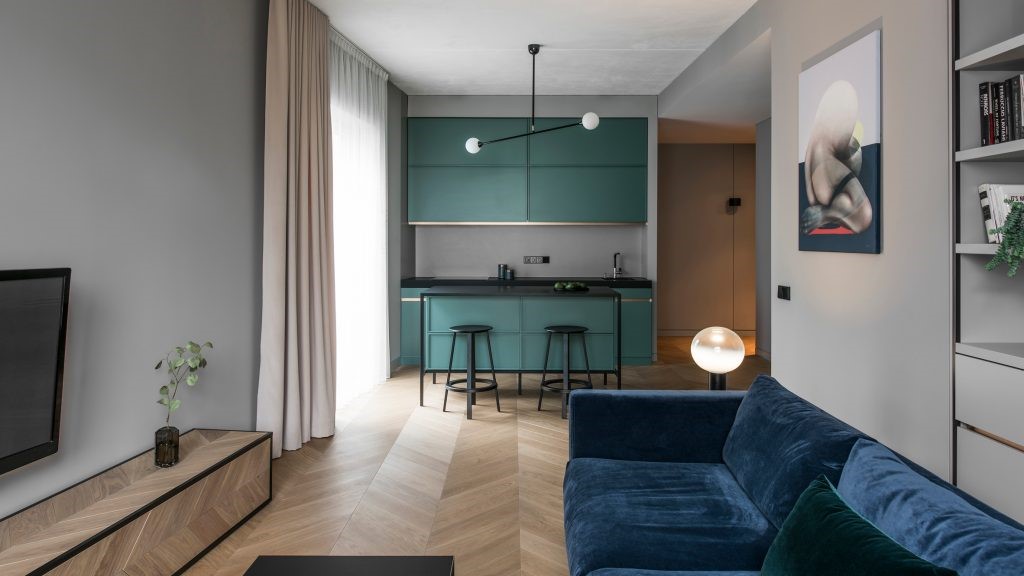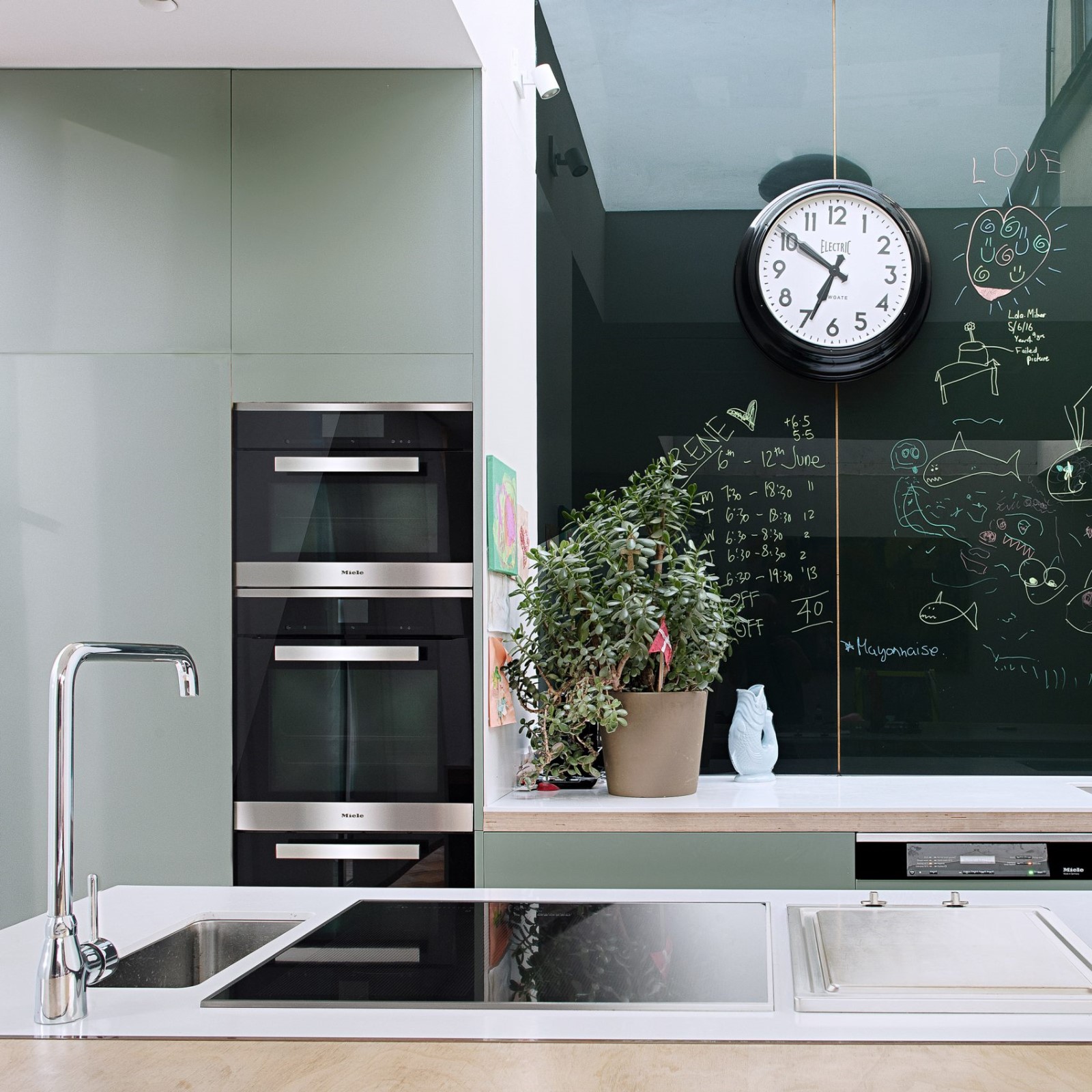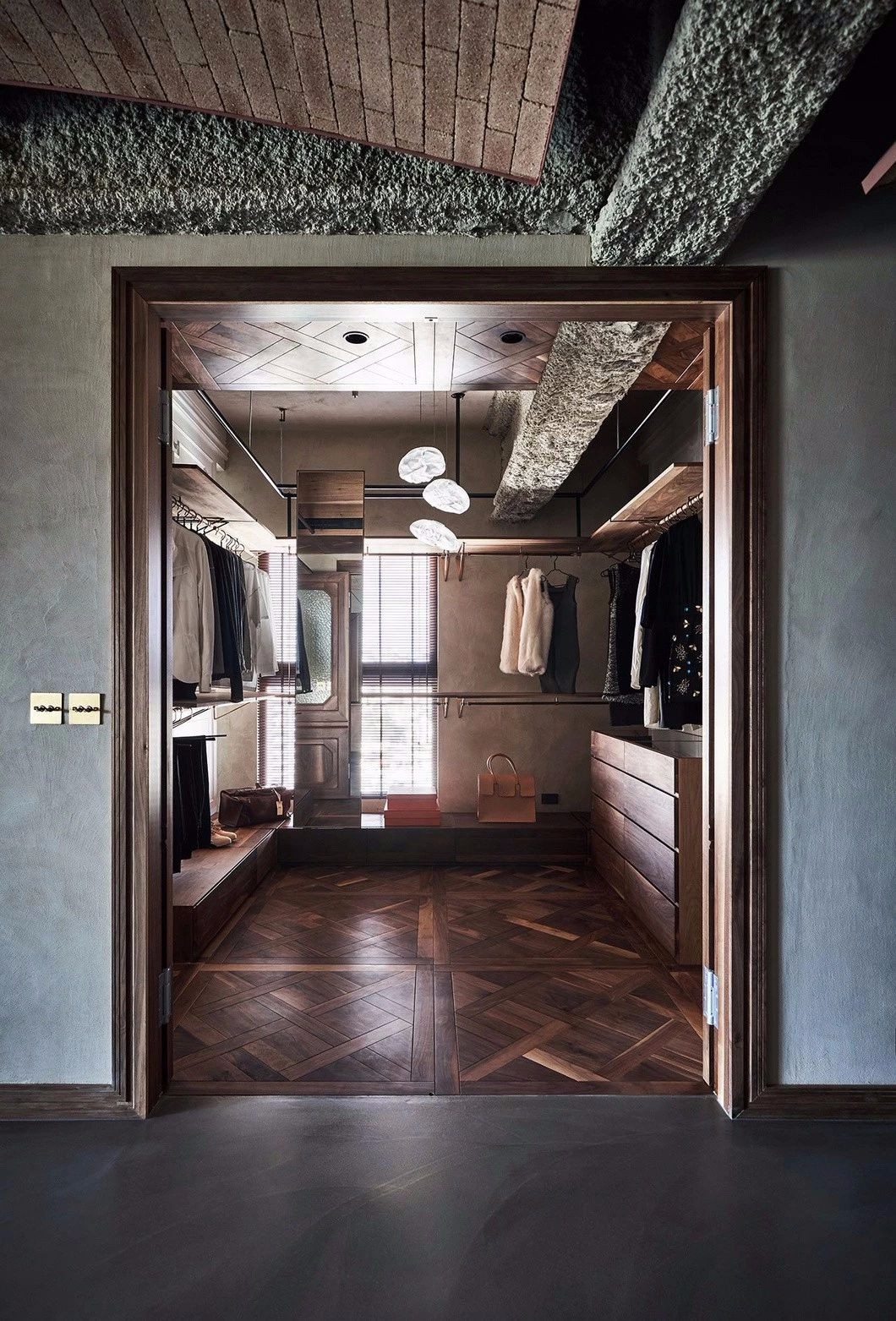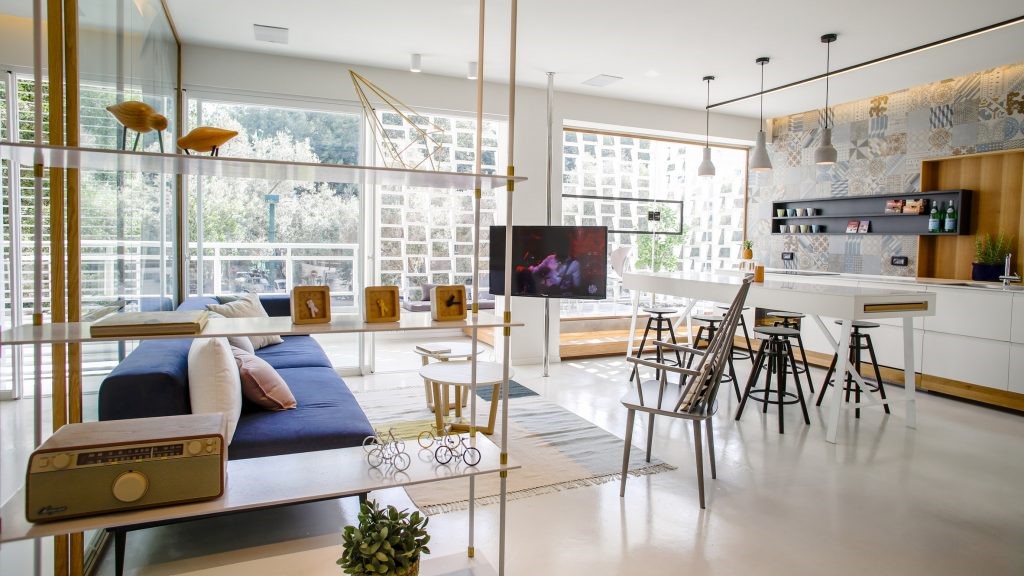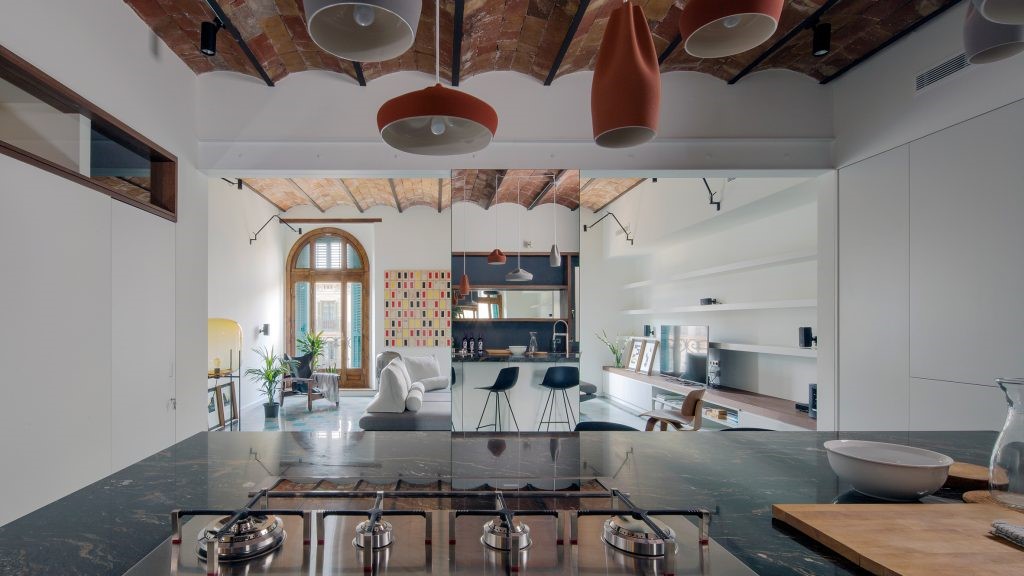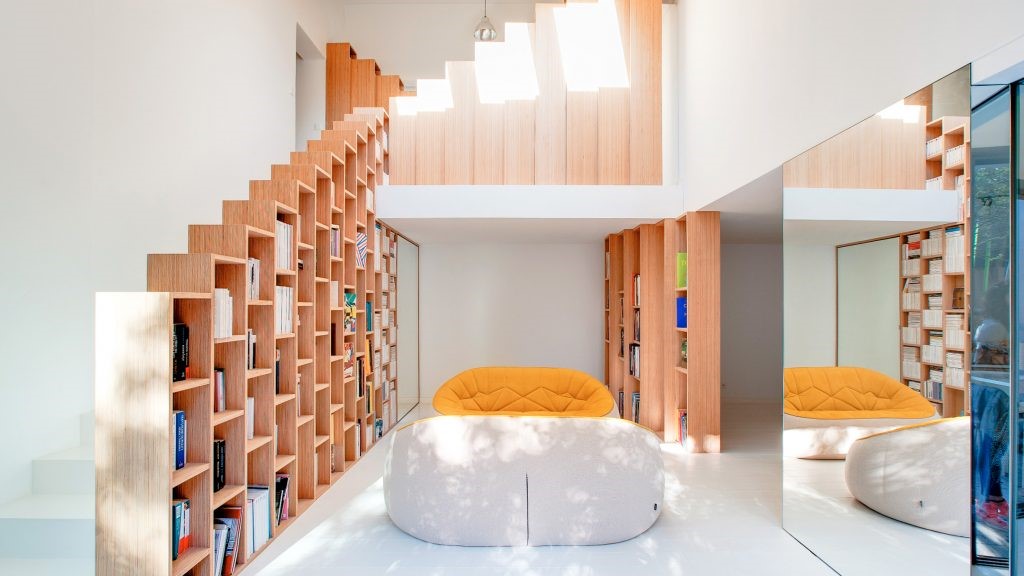Polwaththa House Chinthaka Wickramage Associates
2016-04-16 20:00
架构师提供的文本描述。在科伦坡南部,一片小椰子林,占地约半英亩(80座),俯瞰着一片由主人继承的稻田。物业西侧既有房屋,建筑密度中等,东面则满是包括椰子树在内的成熟树木,而北侧则俯瞰着一片美丽的稻田。此外,还有大量现存的成熟树木存在于遗址边界,几乎是一片“半荒野”。建筑师们面临的挑战是建造一座四卧室的房子,俯瞰这个美好的未来花园,尽可能地保存许多现存的树木。
Text description provided by the architects. A small coconut grove measuring approximately half an acre (80 Perches) overlooking a paddy field, inherited by the owner, was selected to build a house in Sub Urban Colombo. There were existing houses on the Western edge of the property with medium built up density but the Eastern side was full of mature trees including coconut trees, while Northern side overlooked a beautiful paddy field. In addition there were substantial numbers of existing mature trees present at the site boundaries, giving it almost a ‘semi wilderness’. Challenges for the architects were to build a four bedroomed house overlooking this wonderful future garden saving many existing trees as possible.
在项目开始时,这座住宅应该是一个长长的“薄”住宅,只有一个房间厚,这样所有的房间都能分享“花园”的“景观”,给人一种住在椰子庄园的感觉。它还尽可能节省了该地点现有的成熟树木,这在科伦坡郊区是罕见的,在中产阶级向科伦坡东部迁移的压力下,造成中等密度沿道路修建走廊。
At the inception of the project it was conceptualized that this residence should be a long ‘thin’ one only ‘one room’ thick, so that all rooms will have a share of the ‘view’ of the ‘garden’ giving a feeling of living in a coconut estate. It also enabled to save, as much as possible, the existing mature trees at the site, which is a rare occurrence in suburban Colombo, reeling under the pressure of the migration of middle classes to East of Colombo resulting in medium density built up corridors along roads.
科伦坡东部地区感受到了这种压力,特别是在当时的政府之后。在19世纪80年代,80年代决定将行政之都转移到斯里·贾亚瓦德纳内普拉·科特,向东推进科伦坡的城市扩张,以前只限于科伦坡的北部和南部。在斯里兰卡科特议会大楼竣工后,这种城市扩张的变形虫开始吸收尚未被触及的农田。城市中产阶层逐渐向科伦坡东部迁移,导致将更大的农业用地以一种随意的方式划分成较小的地块。这所房子所建的场地是一片设法避免这种现象的土地。
East of Colombo has felt this pressure strongly, especially after the then Govt. in Nineteen Eighties decided to shift the administrative capitol to Sri Jayawardanepura Kotte, creating an Eastward thrust to the Colombo urban sprawl, which was previously limited to Northwards and South wards of Colombo. This Urban sprawl amoeba started absorbing the yet untouched agricultural lands, after the completion of the Sri Lanka’s Parliament building in Kotte. This gradual migration of urban middle classes to the East of Colombo resulted in unplanned sub division of larger agricultural land plots into smaller plot sizes in a haphazard way. The Site this house is built is one land which managed to escape this phenomenon.
该房屋是建立在钢筋混凝土柱和梁的结构,部分上层的‘柚木’木甲板。房子的显著特点是它的单倾斜屋顶,保护薄的长屋段在一次扫描与宽悬垂。从上一层突出和俯瞰花园是室外阳台,由钢筋混凝土板保护,位于上面提到的宽悬垂单斜屋顶之下。
The House is built on reinforced concrete column and beam structure with part of the upper level out of ‘Teak’ timber deck. Significant feature of the house is its mono pitched single sloping roof, protecting the thin long house section in one single sweep with wide overhangs. Projecting from the Upper Level and overlooking the Garden are outdoor balconies protected by a reinforced concrete slab located below the above mentioned wide overhanging mono pitched roof.
这座房子是用钢筋混凝土柱梁建造的,结构骨架在瓦砾地基上,加上砖石填充墙。所有的门窗都是木料和木结构,完全或部分上釉,视位置而定。屋顶是单斜瓦楞纸水泥板屋面,向花园和稻田的景色与慷慨的屋檐。这个倾斜的屋顶有很宽的凸起的屋檐,以便摆脱季风雨。天花板是由银色油漆水泥板(模仿‘金属’天花板)暴露木材萝卜。外墙涂上了一种称为水泥处理墙漆的胶水和水泥混合的特殊油漆,后来用砂纸进行手工切割,然后用一层透明的密封剂密封,这样,成品的颜色-一种带绿色的灰色-将与周围的植被“融合和融合”。内部完成是廉价和硬磨损水泥在较低的水平和当地硬木木材在双高度阳台。更“现代”的材料,如玻璃和钢铁,被用来作为对比,更传统的水泥灰色墙壁与钢直立扶手提供保护阳台‘望’的一面。
The House is built in reinforced concrete column beam structural skeleton on rubble foundations, with plastered brick masonry infill walls. All door windows are timber and timber framed fully or partially glazed depending on location. Roof is mono pitched corrugated cement board roofing sheets, opening out to the garden and paddy field views with generous eaves. This substantially sloping roof has wide projecting eaves in order to shed the monsoon rains. Ceiling is out of silver colour painted cement boards (mimicking ‘metallic’ ceilings) on exposed timber rafters. Exterior walls were painted with a special paint mix of rubberized glue and cement called cement handled wall finish, later hand cut using sand paper and sealed with a clear coat of sealer, so that the finished colour a gray with a greenish tint will ‘blend and merge’ with the surrounding vegetation. Internal finishes are inexpensive and hard wearing –polished cement on the lower level and local hardwood timber on the double height verandah. The more ‘modern’ materials such as glass and steel are used as a contrast to more traditional, cement grey walls with steel upright handrails providing protection to balcony ‘lookouts’ on ‘view’ side.
CONSTRAINTS & SOLUTIONS ACHIEVED
由于半英亩的土地上满是成熟的树木,建筑师们面临的挑战是如何尽可能多地保存现存的树木。其结果是采用了一室厚矩形“薄截面”,方便了现有树木的最小移动,并使住宅内的交叉通风最大化。此外,选择的房子方向是理想的,因为长海拔面向东西,因此建筑师不必在晚上直射阳光,因为西面比东面更坚固。然而,东面通过双高阳台获得了更多的阳光和雨水保护,在这座狭长的住宅内外形成了一个中间缓冲地带。在这里,作为建筑形式的生成者和设计思想的基础,建筑部分优先于规划。它成功地采用了从一个房间宽的矩形块组成热带房屋的原则。
As the half acre land was full of mature trees, challenges for the architects were, how to save as many existing trees as possible. The result was the adaption of the one room thick rectangular ‘Thin Section’ facilitating minimum removal of existing trees and maximization of cross ventilation within the residence. In addition, the chosen orientation of the house is ideal because the long elevations face East and West and consequently the architect did not have to deal with direct sunlight in the evening, as Western façade was more solid compared to Eastern facade. However eastern façade was given additional sun and rain protection by way of a double height verandah creating an intermediate buffer zone between the outside and inside of the Long thin residence. Here the building section takes precedence over the plan as the generator of building form and the basis of design thinking. It successfully employs the principal of composing tropical houses from one room wide rectangular blocks.
房屋规划有二重性:西面的立面相对封闭,窗户开得很小,而东方则比较封闭。
There is duality in the house plan: the West facing elevation is relatively closed, with small window openings, whereas the Eastern & Northern façade is open with larger windows looking towards the Garden & Paddy Fields. The narrowness of the one room wide plan also helps in this respect; by opening windows on the East elevation, through drafts are encouraged. Coconut Trees form backdrops to almost every ‘view’ from balconies.
由于该地点已满是现有的成熟树木,因此不需要以根球再植的方式引进新的树木,因为尽量节省现有的树木。在室内添加了一个浅反射池,作为一个景观特征,并通过蒸发冷空气来冷却这座没有空调的房子内部。外观颜色是精心挑选的,以与周围的绿色植物-“一种‘未完成’的当代建筑,很容易接受一个时代”。其结果是,一座灰色绿色水泥、木材和玻璃的房子在景观中呈现出一片黑暗的异形。这房子与大自然有着特殊的关系。。
As the site was full of existing mature trees, the need to introduce new trees by way of root ball replanting was not necessary as existing trees as much as possible were saved. A shallow reflective Pond was added to the interior of the house as a landscape feature and to cool this non air conditioned house interior through evaporation of cool air. Exterior colours were carefully selected to merge with the surrounding greenery – “an ‘unfinished’ contemporary architecture that readily accepts a patina of age”. The result is a dark alien presence of a house in the landscape in grey green cement, timber and glass. The house has a special relationship with nature. .
大自然本质上是美丽的。它是世界各要素之间奇妙联系的结果。建筑在本质上也是美丽的,因为它是反射的结果,是一种改造或完善环境的建筑,它为人类提供了一个合适的栖息之所,它在阳光照耀下给人遮荫,遮挡雨水,保护它们不受风和寒冷的影响,形成视野。自然可以被建筑升华,建筑可以被大自然美化。因此,自然和建筑似乎是无法解决的联系,结构与它的环境交织在一起。本文所述的案例是一所现代住宅郊区住宅,它通过与周围环境的融合,消除了内外之间的隔阂。没有这就是这所房子的美丽之处,它与自然融为一体,与自然共存。
Nature in essence is beautiful. It is the fruit of wonderful associations between elements of the world. Architecture is also beautiful in essence, because it is the result of reflection followed by a construction which transforms or completes the environment, to offer humans an appropriate habitat, it procures them shade when the sun shines, shelters them from the rain, protect them from wind and cold, frames the views. Nature can be sublimated by architecture and architecture can be glorified by nature. Therefore nature and architecture appear to be insolubly linked, the structures enmeshed with its environment. The case in reference is a contemporary house suburban house which dissolve the barrier between inside and outside by merging with its surroundings. Not with-standing the use of modern technology it is very much in the spirit of a traditional dwelling. And that is the beauty of this abode; it is at one with and coexists with nature.
 举报
举报
别默默的看了,快登录帮我评论一下吧!:)
注册
登录
更多评论
相关文章
-

描边风设计中,最容易犯的8种问题分析
2018年走过了四分之一,LOGO设计趋势也清晰了LOGO设计
-

描边风设计中,最容易犯的8种问题分析
2018年走过了四分之一,LOGO设计趋势也清晰了LOGO设计
-

描边风设计中,最容易犯的8种问题分析
2018年走过了四分之一,LOGO设计趋势也清晰了LOGO设计




















































































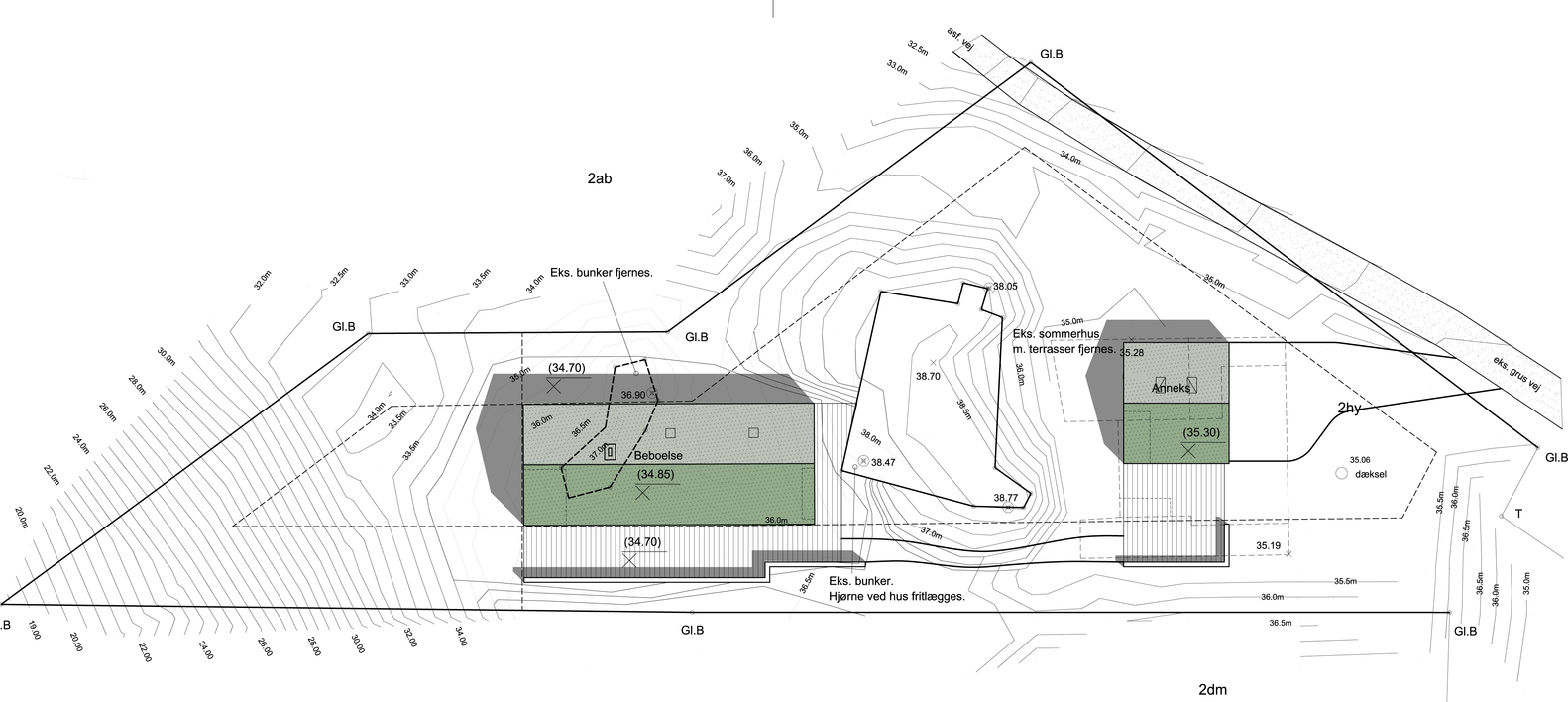
.jpg)
